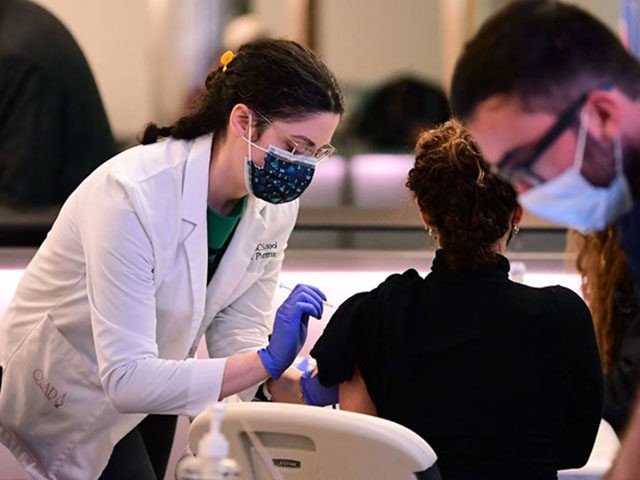Women who received vaccinations against the Chinese coronavirus demonstrated a “delay” in their menstrual cycles of nearly one day “compared to those who were unvaccinated,” according to the findings of a U.S. government-funded study published on Wednesday, Agence France-Presse (AFP) reported.
“COVID-19 [Chinese coronavirus] vaccine was associated with a less than 1-day change in cycle length for both vaccine-dose cycles compared with prevaccine cycles,” according to the study’s results, which were published by the online medical journal Obstetrics & Gynecology on January 5.
“[U]nvaccinated individuals saw no significant change compared with three baseline cycles,” the study’s authors noted.
Chief study author Dr. Alison Edelman of the Oregon Health & Science University led a team of U.S. government-funded researchers to conduct the analysis. The scientists examined the menstrual cycles of roughly 4,000 U.S. women aged 18 to 45 years old “with normal cycle lengths (24–38 days) for three consecutive cycles before the first vaccine dose followed by vaccine-dose cycles (cycles 4–6) or, if unvaccinated, six cycles over a similar time period.”
About 2,400 participants in the study were vaccinated against “COVID-19,” or the disease caused by a type of coronavirus called SARS-CoV-2. “COVID-19” is also known as the Chinese coronavirus. Roughly 1,500 unvaccinated women also participated in the menstrual study for comparison. Of the vaccinated women, 55 percent received doses of a coronavirus vaccine manufactured by Pfizer, 35 percent received a version made by Moderna, and seven percent received a Johnson & Johnson vaccine.
Dr. Alison Edelman told the AFP on January 6 she believes the “immune system’s response” to the Chinese coronavirus vaccine may have caused the changes in women’s menstrual cycles observed in her study.
“We know that the immune system and the reproductive system are interlinked,” she said.
“A revved-up immune system might have an impact on the hypothalamic-pituitary-ovarian axis,” the doctor continued.
Edelman defined this “axis” as a “highway of how your brain talks to your ovaries, talks to your uterus,” or, put more simply, a woman’s “body clock.”
“Specifically, the production of inflammatory proteins called cytokines appears to disrupt the way this axis regulates the timing of menstrual cycles,” the study’s lead author observed.
“The changes seem most pronounced when vaccination takes place early in the follicular phase, which starts on the first day of the menstrual period (bleeding) and ends when ovulation begins,” Edelman noted.
The doctor revealed to AFP that “a subgroup” of participants in her study “who received two injections of the Pfizer or Moderna vaccines during the same cycle, as opposed to two different cycles, saw an average increase in cycle length of two days.”
Pfizer‘s coronavirus vaccine consists of two doses administered 21 days apart. Moderna‘s coronavirus vaccine requires two doses administered 28 days apart. Johnson & Johnson‘s coronavirus vaccine consists of a single dose. Both Pfizer and Moderna use new mRNA technology as the basis for their “COVID-19” vaccines while Johnson & Johnson uses a more established “viral vector” vaccine technology.
“Viral vector vaccines use a modified version of a virus that is different from the virus being targeted to deliver important instructions to our cells [i.e how to fight the targeted virus upon future infection]. The modified version of the virus is called a vector virus,” according to the U.S Centers for Disease Control and Prevention (CDC).
“COVID-19” vaccines based on mRNA technology, which did not exist in an authorized form prior to March 2020, “use the genetic sequence or ‘code’ of the antigen [inactivated virus proteins] translated into mRNA,” according to the BBC.
“It’s a ghost of the real thing, fooling the body into creating very real antibodies,” the British broadcaster detailed in November 2021.
“The artificial mRNA itself then disappears, degraded by the body’s natural defences including enzymes that break it down, leaving us with only the antibodies,” the BBC explained.

COMMENTS
Please let us know if you're having issues with commenting.